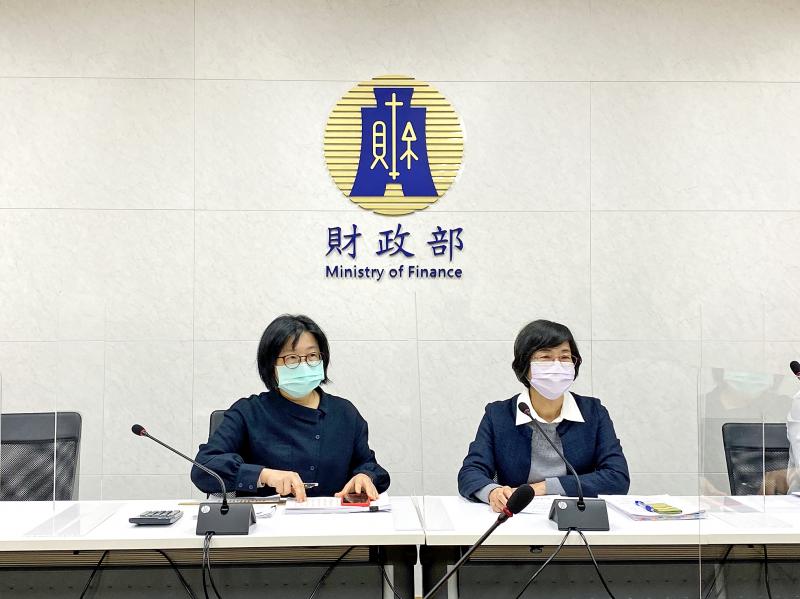The central government last month received NT$203.2 billion (US$7.29 billion) in tax revenue, an 8.4 percent rise from a year earlier to a historical high, as a healthy economy boosted personal and corporate incomes, the Ministry of Finance said yesterday.
The high draw came despite securities transaction tax revenue registering a 17.8 percent retreat year-on-year, ending 27 straight months of gains, as the specter of interest rate hikes and geopolitical tensions abroad drove investors to cut equity positions, factors that persist this month, the ministry said.
The timing of the Lunar New Year holiday had much to do with the advance in overall tax revenue, Department of Statistics Deputy Director-General Chen Yu-feng (陳玉豐) said, adding that year-end bonuses led to personal income tax revenue rising by 32 percent to NT$38.6 billion last month.

Photo: Clare Cheng, Taipei Times
Corporate tax revenue soared nearly threefold to NT$4.8 billion, partly because tax returns lowered the comparison base last year, Chen said.
Tech and non-tech firms had a profitable year, although companies reliant on domestic demand were hit hard by local COVID-19 outbreaks, government data showed.
Companies are generally positive about business this year, as the world is expected to emerge further from the COVID-19 pandemic, fueling demand for new technology products and applications.
However, securities transaction taxes, the main revenue driver in the past two years, posted the first decline in 27 months to NT$17.4 billion, as domestic and foreign players retreated to the sidelines on concerns that central banks globally are expected to raise interest rates to curb inflation, Chen said.
Uncertainty has also grown over potential military conflicts between Russia and Ukraine, she said.
Unease explained why US 10-year US Treasury yields topped 2 percent and the TAIEX yesterday tumbled below 18,000 points, Chen said, adding that things might remain fluid in the near future.
Daily stock turnover averaged NT$348.2 billion last month, down 18.78 percent from the same time last year, government data showed.
Tax revenue from land value increases amounted to NT$10.7 billion, a 1.2 percent rise from a year earlier, although the number of taxable deals dropped by 1.9 percent to 63,873, the ministry said.
The ministry yesterday also revised tax revenue surplus projections for last year that were 19.8 percent higher than budgeted to NT$432.7 billion, compared with NT$402.4 billion the ministry expected one month earlier, an 18.6 percent gain, Chen said.

NEW IDENTITY: Known for its software, India has expanded into hardware, with its semiconductor industry growing from US$38bn in 2023 to US$45bn to US$50bn India on Saturday inaugurated its first semiconductor assembly and test facility, a milestone in the government’s push to reduce dependence on foreign chipmakers and stake a claim in a sector dominated by China. Indian Prime Minister Narendra Modi opened US firm Micron Technology Inc’s semiconductor assembly, test and packaging unit in his home state of Gujarat, hailing the “dawn of a new era” for India’s technology ambitions. “When young Indians look back in the future, they will see this decade as the turning point in our tech future,” Modi told the event, which was broadcast on his YouTube channel. The plant would convert

‘SEISMIC SHIFT’: The researcher forecast there would be about 1.1 billion mobile shipments this year, down from 1.26 billion the prior year and erasing years of gains The global smartphone market is expected to contract 12.9 percent this year due to the unprecedented memorychip shortage, marking “a crisis like no other,” researcher International Data Corp (IDC) said. The new forecast, a dramatic revision down from earlier estimates, gives the latest accounting of the ongoing memory crunch that is affecting every corner of the electronics industry. The demand for advanced memory to power artificial intelligence (AI) tasks has drained global supply until well into next year and jeopardizes the business model of many smartphone makers. IDC forecast about 1.1 billion mobile shipments this year, down from 1.26 billion the prior

People stand in a Pokemon store in Tokyo on Thursday. One of the world highest-grossing franchises is celebrated its 30th anniversary yesterday.

Zimbabwe’s ban on raw lithium exports is forcing Chinese miners to rethink their strategy, speeding up plans to process the metal locally instead of shipping it to China’s vast rechargeable battery industry. The country is Africa’s largest lithium producer and has one of the world’s largest reserves, according to the US Geological Survey (USGS). Zimbabwe already banned the export of lithium ore in 2022 and last year announced it would halt exports of lithium concentrates from January next year. However, on Wednesday it imposed the ban with immediate effect, leaving unclear what the lithium mining sector would do in the